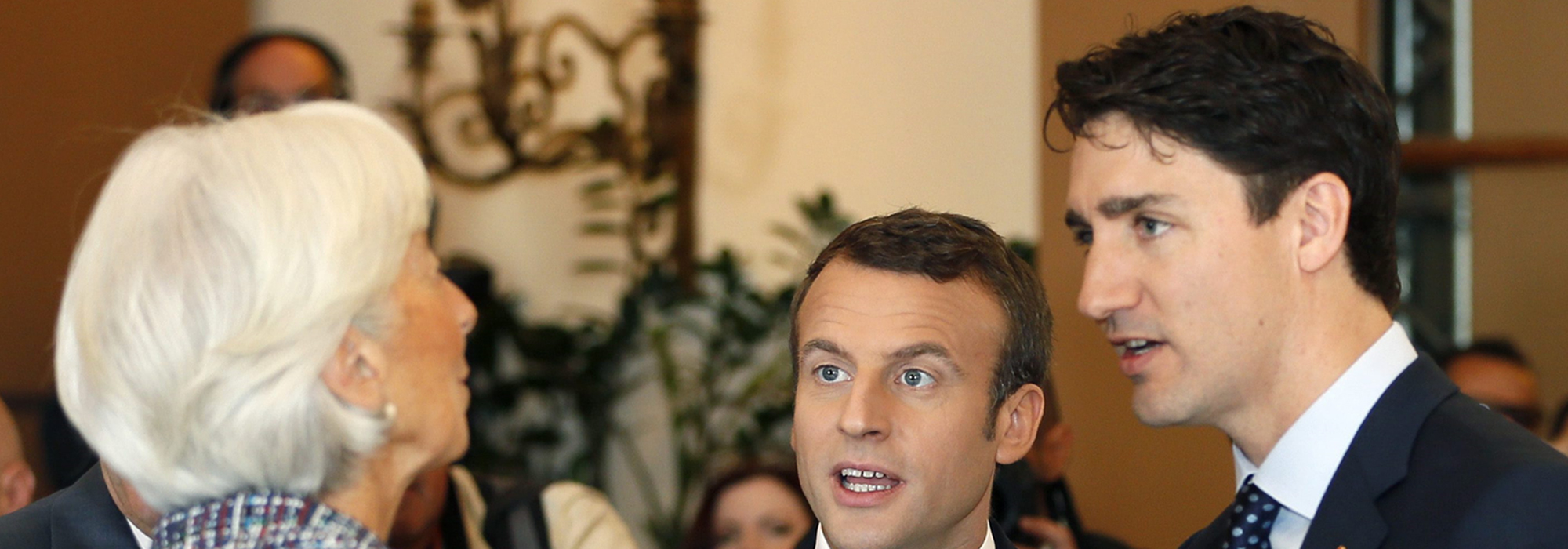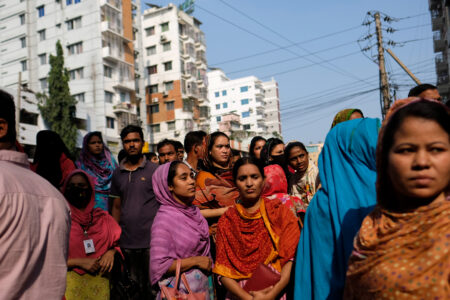
Canada is a country that can legitimately claim to be advancing inclusive economic growth and a liberal international order. When it takes on the G7 presidency next year, Canada will be uniquely positioned to convene international players and to trigger global action on critical emerging issues. From mitigating economic dislocation linked to automation and the fourth industrial revolution, to leveraging public and private dollars to finance productivity-boosting infrastructure and clean innovation, to promoting financial inclusion and trade liberalization arrangements that benefit all citizens — the international community is looking to Canada to build consensus at a time of polarization and anxiety.
That was my take-away from the 2017 spring meetings of the World Bank and the International Monetary Fund (IMF), which I attended as head delegate for Young Diplomats of Canada, an NGO that engages diverse young Canadians in global affairs and multilateralism. The spring meetings bring together finance ministers, international development ministers, central bankers, globally oriented corporations and investors, and civil society organizations to take stock of the world economy and the interventions being deployed to end poverty.
My views on Canada’s leadership opportunities are informed by discussions with a range of actors – from thought leaders at the Wilson Center and the Brookings Institution, to youth delegates from Brazil, Yemen and everywhere in between. In each conversation, I heard enthusiasm for Canada’s policy mix, which prioritizes investment in infrastructure to boost growth and productivity. I also heard calls for Canada to fill the void of progressive leadership, alongside governments like those of Emmanuel Macron in France. I also heard significant interest from governments and civil society representatives in domestic policy developments in Canada, from the Pan-Canadian Framework on Clean Growth and Climate Change to Global Affairs Canada’s International Assistance Review, whose final report is highly anticipated at the World Bank headquarters.
While Canada is probably not ready to lead a global initiative on government productivity (the World Economic Forum’s 2017 Global Competitiveness Report says “inefficient government bureaucracy” is still a barrier to prosperity in Canada), there are important areas emerging from the spring meetings that will require full engagement from governments, international institutions, the private sector and civil society. Canada today arguably has unsurpassed convening power, and Prime Minister Justin Trudeau can harness this power during Canada’s G7 presidency in 2018 to elevate global conversations and progress on the global skills agenda, clean innovation and women’s economic empowerment.
A global skills agenda for the fourth industrial revolution
With a skilled, well-educated and “resourceful” workforce, as Trudeau calls it, Canada is better prepared than many countries to adapt to the exigencies of the fourth industrial revolution. Klaus Schwab, the executive chairman of the World Economic Forum, says this revolution is “characterized by a fusion of technologies that is blurring the lines between the physical, digital, and biological spheres.” It’s a phenomenon evolving at an exponential rather than linear rate and is guiding the “transformation of entire systems of production, management, and governance.”
Walter Isaacson, CEO of the Aspen Institute, addressed the impacts of automation on global inequality at the opening event of the spring meetings. He argued that the spheres of health care, education and finance are most ripe for disruption, and he cautioned against an exclusive focus on science, technology, engineering and mathematics skills development. Creativity and critical thinking remain irreplaceable traits and assets, and nurturing such executive functions while also ensuring that young people gain technological competencies is a central challenge for all countries.
While Canada continues to deliver a high-quality education to people between the ages of 5-19 and is leading the pack on rankings for education and skills, our schooling system is not allowing the majority of young people to develop the skills to thrive in an age of unprecedented technological integration. Universities and forward-thinking companies are developing work-integrated learning opportunities that will provide valuable lessons for broader government-supported programs in this area.
The federal government’s Advisory Council on Economic Growth recently proposed the creation of a FutureSkills Lab, a “laboratory for skills development and measurement in Canada.” The proposed lab — a collaboration between the private sector, multiple levels of government, unions and NGOs — would finance innovative proposals for addressing skills gaps among workers, students and youth; respond to labour market signals regarding skills needs; and measure outcomes and disseminate best practices in skill development.
No doubt the FutureSkills Lab initiative and other projects would be of interest to Canada’s bilateral partners. Canada could consider a signature initiative on global skills during its G7 presidency. This is an issue of deep sensitivity for many countries, such as those in the Middle East faced with soaring youth unemployment and an acute awareness of the national security implications of the status quo.
Financing clean innovation for a just transition to a lower-carbon economy
The world is paying close attention to how well Trudeau can deliver on his promise to simultaneously protect the environment and grow the economy. The federal-provincial-territorial agreement on a carbon pricing framework was singled out for praise by the IMF’s Christine Lagarde and by World Bank Group President Jim Yong Kim. Canada was also named co-chair of the Carbon Pricing Leadership Coalition, which is mobilizing a broad spectrum of actors to advance successful policies for pricing carbon pollution.
While Canada navigates the transition to a lower-carbon economy, there is a unique opportunity to lead the global conversation on balancing economic objectives with the urgent imperative of climate action. To be sure, Canada’s approach has faced skepticism — a recent Guardian op-ed chastised the Prime Minister for saying “all the right things” about the environment while approving pipelines to transport bitumen from Alberta’s oil sands. Still, the government’s determination to get the balance right should be a source of inspiration to other countries. Canada is already a key player in ensuring the full and effective implementation of the Paris Agreement on climate change. This highly visible leadership, along with Canada’s investments linked to Mission Innovation (a global clean energy initiative) and the Green Climate Fund, provides an opportunity for Canada to forge consensus on the need for smart investments in clean innovation.
Empowering women to participate fully in the financial system
An important focus of the spring meetings was on eliminating gaps in women’s access to and use of financial services. Finance Minister Bill Morneau and International Development Minister Marie-Claude Bibeau both participated in a highly stimulating panel, “Closing the Gender Gap in Finance,” which also featured Phumzile Mlambo-Ngcuka, the executive director of UN Women. Because financial inclusion is vital to inclusive economic development and the realization of the 2030 Agenda for Sustainable Development, there is clear value in devoting resources to addressing the remaining barriers.
Canada’s ministers cited the sophisticated gender-based analysis undertaken as part of the 2017 federal budget and the Canadian approach to development assistance prioritizing women and girls. The noticeable alignment between them made it apparent that Canada has a unique opportunity to support women’s economic empowerment globally.
Our country’s reliable financial system, and strong domestic institutions that are committed to advancing gender equality, make Canada a natural leader in this area. Canada can help advance efforts to promote financial inclusion with a focus on women, including testing and deployment of fintech solutions, such as digital payments and blockchain systems.
As a Canadian in Washington for my first World Bank/IMF spring meetings, I was struck by the level of interest that international attendees showed in policy developments in Canada. Canada’s engagement is bearing fruit not only in advancing national interests, but also in serving as a lab for smart solutions for infrastructure investment, climate change mitigation and adaptation, humanitarian protection, women’s economic empowerment and much more.
As John McArthur explained during our delegation’s visit to the Brookings Institution, Canada has “outsized capacity to effect global outcomes.” He characterized Ottawa as a bellwether, using the example of Canada’s radical policy shift on climate change between the former and current governments to illustrate that Canada’s positions carry influence in multilateral forums. The negotiations to finalize the Paris Agreement also demonstrated Canada’s ability to build coalitions with a wide range of actors in pursuit of global public goods.
With a view to tomorrow’s complex challenges, Canada can leverage concrete opportunities to convene difficult conversations, build trust among diverse actors and lead problem-solving exercises in support of inclusive growth and sustainable development.
Photo: Managing Director of the International Monetary Fund Christine Lagarde, left, speaks with Canadian Prime Minister Justin Trudeau, right, and French President Emmanuel Macron, cente, during a G7 summit in Taormina, Italy, Saturday, May 27, 2017. (AP Photo/Domenico Stinellis)
Do you have something to say about the article you just read? Be part of the Policy Options discussion, and send in your own submission. Here is a link on how to do it. | Souhaitez-vous réagir à cet article ? Joignez-vous aux débats d’Options politiques et soumettez-nous votre texte en suivant ces directives.









